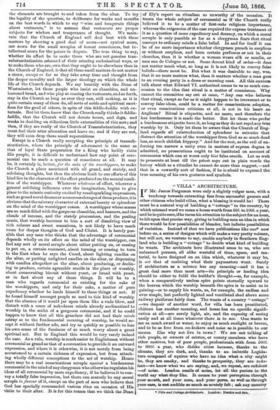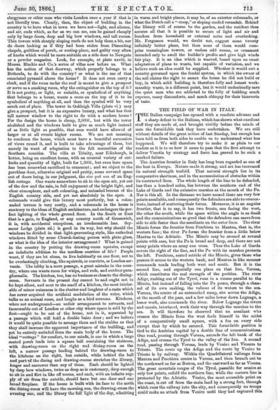" VILLA " ARCHITECTURE.
IF Mr. James Fergusson were only a slightly vulgar man, with a tendency towards extracting fees from successful grocers and other citizens who build villas, what a blessing it would be ! There must be a natural way of building a " cottage " in the country, by which misused word we means house worth from 50/. to 100/. a year, and he is quite sure, if he turns his attention to the subject for an hour, to hit upon that precise way, giving to building men an idea in which there would be few possibilities of blunder, but infinite possibilities of variation. Instead of that we have publications like one* now before us, a series of designs which will make a very pretty volume, but -will not, we venture to say, enable anybody in Southern Eng- land who is building a " cottage " to decide what kind of building he wants. The architetts here illustrated seem to us, who are unlearned persons, all alike wasteful of time, space, and ma- terial, to have designed on an idea which, whatever it may be, is not that of realizing what their paymasters want. Surely if architecture as a science has any meaning—and it has a great deal more than most arts—its principle or leading idea should be either to fulfil the builder's thought—as, for example, when a comparatively useless spire points eternally upward to the heaven which the worship beneath the spire is to assist us in gaining—or to supply his wants, as, for example, the endless and over simple, but perfectly lighted and ventilated shed above some railway platforms fairly does. The wants of a country "cottage" —we despair of another word, for villa has been prostituted, chateau has another meaning, and house has no specific signifi- cation at all—are surely light, air, and the capacity of seeing easily and at all times whatever there is to see. One wants to see as much sward or water, to enjoy as much sunlight or breeze, and to be as free from on-lookers and noise as is possible to our means. Else why not live in town ? We are not talking of rich people, or owners of estates, or county members who have other motives, but of poor people, professionals with from 5001. to 800/. a year, who dislike cities because, thanks to the climate, they are dark, and, thanks to an imbecile Legisla- ture composed of squires who have no idea what a city might be, they are smoky, and thanks to prosperity, they are redo- lent—we know what we are saying, and, we repeat, are redolent —of noise. London smells of noise, let all the purists in the world say what they like. It comes to your perception through your mouth, and your nose, and your pores, as well as through your ears, is not audible so much as acutely felt ; ask any country * Villa and Cottage Architecture. Loudon; Illackie sad Sou. clergyman or other man who visits London once a year if that is not literally true. Clearly, then, the object of building in the country is to have what in town we have not—light, and silence, and air, ends which, as far as we can see, can be gained cheaply only by large doors, deep and big bow windows, and tall rooms. Thin towers with sharply sloping roofs do not help them a bit, nor do doors looking as if they had been stolen from Dissenting chapels, guiltless of porch, or resting-place, and guilty very often of knobs which would be more suitable on a side door to Newgate or a powder magazine. Look, for example, at plate xxviii. in Messrs. Blackie and Co.'s series of villas now before us. What has the notion of that doorway, which properly belongs to a Bethesda, to do with the country? or what is the use of that emaciated pyramid above the house? It does not even carry a clock, and if the room under the roof is meant to give a prospect or serve as a smoking room, why the extinguisher on the top of it ? It is not pretty, or light, or suitable, or symbolical of anything that belongs to a house, wants a cross on the top of it to be symbolical of anything at all, and then the symbol will be very much out of place. The tower in Oakleigh Villa (plate vi.) may give a prospect, but it is an expensive luxury, and what has that tall narrow window to the right to do with a modern house ? For the design the house is cheap, 2,000/., but with the tower abolished and the windows built to give as much light instead of as little light as possible, that sum would have allowed of larger or at all events higher rooms. We are not meaning to condemn the house, which must have a beautiful succession of views round it, and is built to take advantage of them, but merely its want of adaptation to the felt necessities of the Southern counties. The villa at Trinity, near Edinburgh, is better, being an excellent house, with an unusual variety of out- looks and quantity of light, built for 1,3004 but even here space has been somewhat sacrificed to ornament ; and we object to the porchless door, otherwise original and pretty, some covered space out of doors being, in our judgment, the sine qua non of an Eng- lish cottage. One wants somewhere to sit in the open air, yet out of the dew and the rain, in full enjoyment of the bright light, and clear atmosphere, and soft colouring, and unloaded breezes of the English country aide, and yet not absolutely in the open. A colonnade would give this luxury most perfectly, but a colon- naded terrace is very costly, and a colonnade in the house is contrary to the ideas of English architecture, and endangers the per- fect lighting of the whole ground floor. In the South or East that is a gain, in England, or any country north of Greenwich, it is,. with accidental exceptions, an irredeemable loss. Sey- mour Lodge (plate iii.) is good. in its way, but why should the windows be divided in that light-preventing style, like cathedral windows fitted by some Church-hating person with plate glass, tr what is the idea of the interior arrangement ? What is gained in the country by putting the drawing-room upstairs, except an indefinite addition to the needless exertion of life ? People want, if they are let alone, to live habitually on one floor, not to be everlastingly climbing, like squirrels, or convicts, or London ser- vants. The lobby is a mere passage, a great mistake in the coun- try, where one wants room for whips, and rods, and outdoor para- phernalia. The kitchen, too, has no business so close to the dining- room. Servants in the present day cannot be and ought not to he kept silent, and next to the smell of a kitchen, the most intoler- able of minor nuisances is the chatter and laughter of a caste which has never acquired the artificial modulation of the voice, which talks as an animal roars, and laughs as a bird screams. Kitchens, when not underground—an unfair arrangement to servants, and inexcusable out of London or other city where space is sold by the foot—ought to be out of the house, not in it, separated by a passage which will hold a double baize door ; and we believe it would be quite possible to arrange them and the stables so that they shall increase the apparent importance of the building, and yet be entirely secluded from the main body- of the house. The ideal " cottage " for comfort, to our minds, is one in which a large seated porch leads into a square hall containing the staircase, with drawing-room on the right and dining-room on the left, a narrow passage leading behind the drawing-room to the kitchens on the right, but outside, while behind the hall and part of the dining and drawing-rooms stretches the library, longer and narrower than any of them. Each should be lighted by deep bow windows, twice as deep as is customary, deep enough to sit in and flirt in like off rooms, and each, with an infinite sup- ply of air from the outside, should have but one door and one broad fireplace. If the house is built with its face to the north the dining-room will have the morning sun, the drawing -room the evening sun, and the library the full light of the day, admitting in warm and bright places, it may be, of an exterior colonnade, or what the Dutch call a "stoop," or sloping-roofed verandah. Behind the library will of course be the garden, and the resident thus Bemires all that it is possible to secure of light and air and freedom from household or external noise and overlooking. Mr. Fergusson would, we doubt not, suggest 801110 twenty infinitely better plans, but then none of them would com- prise meaningless towers, or useless odd rooms, or ornament intended only to swell the builder's profits and give high winds fair play. It is an idea which is wanted, based upon an exact adaptation of plans to wants, but capable of variation, and we believe such an idea could be supplied. Whether it would suit a country governed upon the feudal system, in which the owner of the soil claims the right to annex the house he did not build or buy, in which solid building is therefore folly and honest work- manship waste, is a different point, but it would undoubtedly save the quiet men who are addicted to the folly of buikling mach expense, many discomforts, and much obloquy for their bizarrerie of taste.































 Previous page
Previous page